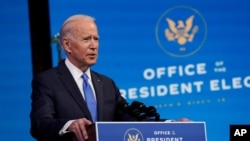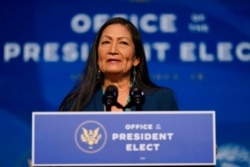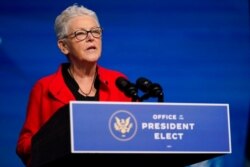“We literally have no time to waste,” U.S. President-elect Joe Biden said Saturday as he introduced to the public the team that will advance his ambitious climate change and energy agenda.
“Folks, we’re in a crisis,” he said. “Just like we need a unified national response to COVID-19, we need a unified national response to climate change. We need to meet the moment with the urgency it demands, as we would during any national emergency.”
With Democrats clinging to a slim majority in the House of Representatives and control of the Senate still undecided, the Biden administration may achieve little success in Congress, potentially forcing it to depend on rule changes at regulatory agencies to enact change.
The team, which environmental groups have largely praised for its experience and diversity, comprises six members.
First to be introduced was Democratic U.S. Representative Deb Haaland of New Mexico, who would be the first Native American to lead the Interior Department.
“We know that climate change can only be solved with participation of every department and of every community coming together in common purpose — this country can and will tackle this challenge,” she said, adding, “I’ll be fierce for all of us, for our planet, and all of our protected land.”
Next to be introduced was Jennifer Granholm, chosen to be head of the Department of Energy. Granholm was the governor of Michigan during the Great Recession when the U.S. auto industry nearly collapsed.
“Over the next two decades, countries will invest trillions of dollars in electric cars, solar panels, wind turbines, and energy-efficient appliances and buildings,” Granholm said. “The path to building back better starts with building and deploying
those products here, stamping them 'Made in America,' and exporting them around the world.”
Gina McCarthy, former President Barack Obama’s Environmental Protection Agency administrator, will be responsible for implementing Biden’s domestic agenda in the newly created position of national climate adviser.
As she spoke Saturday, McCarthy recalled her childhood in the Boston area before the first Earth Day and swimming in the Boston Harbor, emerging covered with oil.
North Carolina’s top environmental regulator, Michael Regan, has been nominated by Biden to serve as EPA administrator. Regan, who has led the North Carolina Department of Environmental Quality since 2017, previously worked at the EPA during the administrations of former Presidents Bill Clinton and George W. Bush.
“This opportunity,” he said Saturday, “is a dream come true. Since the start of my career, my goals have been the same: to safeguard our natural resources; to improve the quality of our air and water; to
protect families and communities and help them seize the opportunities of a cleaner, healthier world.”
Environmental lawyer Brenda Mallory, who will chair the White House Council on Environmental Quality, said Biden’s Build Back Better plan will breathe new life into the council, enabling it to work with many partners on a broad range of issues and tackle the full breadth of climate change.
Finally, climate expert and Biden adviser Ali Zaidi, who came to the U.S. from Pakistan as a child with his family, will serve as deputy national climate adviser.
“I am deeply honored to answer your call to serve this nation that I love, especially at this moment of consequence,” he said.
If confirmed by the Republican-majority Senate, Haaland would be the first Native American to hold a U.S. Cabinet position, Regan would be the first Black man to lead the EPA, and Mallory would be the first African American to head the Council on Environmental Quality.
While the team has been largely well-received by environmental groups, the influential fossil fuel industry has warned Biden, a frequent critic of the sector, to balance climate initiatives with job preservation.
“We will … be watching closely to ensure that the incoming administration keeps President-elect Biden’s campaign promises to the energy workforce and protects the millions of jobs supported by our industry in states like New Mexico, Ohio, Pennsylvania and across the country,” American Petroleum Institute President Mike Sommers said in a statement.
Biden has promised to make the fight against global warming a top priority. He has pledged to cut U.S. greenhouse gas emissions to net-zero by 2050, stop all emissions from U.S. power plants by 2035 and immediately re-enter the Paris Agreement on climate change.











